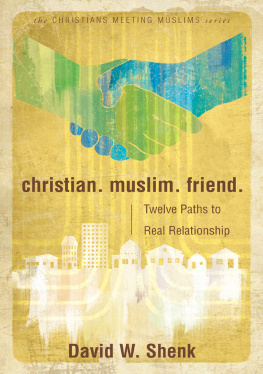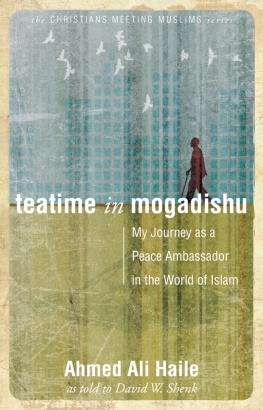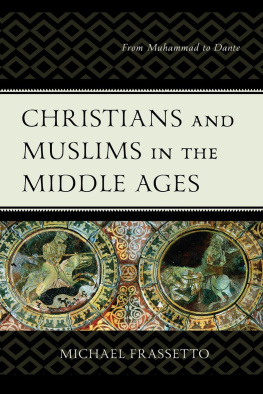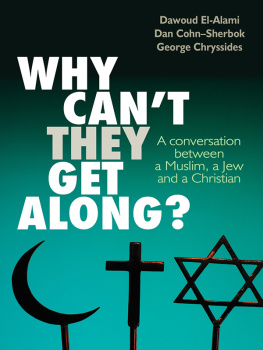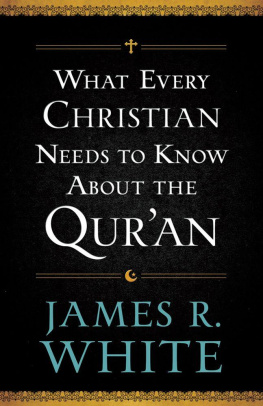
As the storms of conflict rage between Muslims and Christians, this book is a thunderclap of grace. Without compromising his convictions and coming from deep personal experiences, David Shenk brings powerful wisdom and empathy to a divided world.
Rachel Pieh Jones, writer and blogger
This book is infused with evidence of the authors personal integrity shaped by a tradition of Christianity known for its unambiguous commitment to peace and peacebuilding. This work will appeal to all Christians seeking to relate to Muslims; it will also connect with Muslims open to seeing a sympathetic reflection of themselves in its pages.
David Singh, research tutor in Islamic studies, Oxford Centre for Mission Studies
I have not only learned much from this book, but I have also been greatly challenged in the way I seek to build relationships in peacemaking. I heartily recommend this book to all who are keen to build bridges to the Muslim community.
Tan Kok Beng, chair, Bethany International University, Singapore
Out of a deep well of experience, Shenk provides instructive, practical ways for Christians to journey with Muslims as friends. I strongly recommend this book for those who seek to be bearers of Gods message of reconciliation in a broken and troubled world.
John Azumah, associate professor of world Christianity and Islam, Columbia Theological Seminary
Shenk insists that we can remain deeply committed to our own faith while pursuing authentic relationship with those deeply committed to theirs. His lifelong experience with Christian-Muslim interaction offers both clarity about the challenges of these relationships and hope for peace among all the children of Abraham.
Laurie Mellinger, academic dean, Evangelical Seminary
At this critical hour, Shenks prophetic call to close the chapter of historic mistrust and hostilityand embrace with hope the risk of sincerely conversing with ones Muslim neighborsmust be accepted by all who seek peace in the world.
Andrew F. Bush, professor of missions, Eastern University
Provides practical steps, thoughtful analysis of competing approaches, and inspiring examples of how to respectfully engage Muslims without compromising a commitment to Christ. This books message is sorely needed on our college campuses in this age in which relativism and hostility seem to be the only available options.
Lorri Bentch, vice president of operations, Christian Union
Drawing on his personal experiences in many Muslim countries, Shenk provides deep insights from his Christian faith with humility and transparency. At the same time he names the differences between the two Abrahamic faiths, leaving readers to draw their own conclusions. I heartily endorse this very important book.
Nelson Okanya, president, Eastern Mennonite Missions
The many stories of direct personal engagement with Muslims from various countries and walks of life demonstrate that real dialogue, where both parties are true to their deepest convictions, is possible. In fact, such dialogue is the only kind worth having. If your deep desire is to love Muslims as Jesus does, this book will be a great aid in walking that path.
Steven J. Van Zanen, director for missions education and engagement, Christian Reformed World Missions
David Shenk has been a guest in our home during the years our family served in central Asia and often wove entertaining stories for us about his adventures in Africa. This book is no different, combining many personal stories with important lessons about the paths that lead to strong Christian-Muslim relationships.
Sara H. Martin, student, Wheaton College

Library of Congress Cataloging-in-Publication Data
Shenk, David W., 1937-, author.
Christian, Muslim, friend : twelve paths to real relationship / David W. Shenk.
pages cm
Includes bibliographical references.
ISBN 978-0-8361-9905-5 (pbk. : alk. paper) 1. Islam--Relations--Christianity. 2. Christianity and other religions--Islam. 3. Peace-building--Religious aspects--Christianity. 4. Religious pluralism--Christianity. I. Title.
BP172.S5138 2014
261.27--dc23
2014028458
CHRISTIAN. MUSLIM. FRIEND.
Copyright 2014 by Herald Press, Harrisonburg, Virginia 22802
Released simultaneously in Canada by Herald Press,
Kitchener, Ontario N2G 3R1. All rights reserved.
Library of Congress Control Number: 2014028458
International Standard Book Number: 9780836199055
Printed in the United States of America
Cover and interior design by Reuben Graham
All rights reserved. This publication may not be reproduced, stored in a retrieval system, or transmitted in whole or in part, in any form, by any means, electronic, mechanical, photocopying, recording, or otherwise without prior permission of the copyright owners.
Scriptures taken from the Holy Bible, New International Version, NIV. Copyright 1973, 1978, 1984, 2011 by Biblica, Inc. Used by permission of Zondervan. All rights reserved worldwide. www.zondervan.com The NIV and New International Version are trademarks registered in the United States Patent and Trademark Office by Biblica, Inc.
Quran quotations are from The Holy Quran, Text, Translation, and Commentary, by Abdullah Yusuf Ali. Published (1968) under supervision of Dar al Arabia, Beirut, Lebanon.
To order or request information, please call 18002457894 in the U.S. or 18006316535 in Canada. Or visit www.heraldpress.com.
To Ahmed Ali Haile,
an ambassador of peace
Foreword
M any years ago David Shenk and I were in Hartford, Connecticut, going to an evening lecture on Muslim-Christian relations by Kenneth Cragg, who has influenced not only us but a whole generation in the field. We each mistakenly assumed the other knew the way to the lecture hall. Finally, when we were completely lost, we had to ask a stranger, who showed us the way.
The present volume points out twelve paths to a real relationship between Muslims and Christians. David not only knows them but has walked them all many times. This is the major value of the book. He not only shows the importance of each path but gives examples from his own experience of how he has dealt with the stumbling blocks involved. He clarifies the core similarities and differences between the Christian church and the house of Islam so we know where we converge and where we diverge.
Some paths of relationship are clearcultivating respect, practicing hospitality, and confronting distortions. Other paths are more challenginghow to live with integrity, have a clear identity, develop trust, and answer questions in contexts where evangelism is forbidden by law and we are guests. The examples he provides and the responses he gave in concrete situations are particularly instructive. Also illuminating is the way he and others he has known have been able to partner with persons of peacesome of whom were originally Muslim militants. Throughout, he merges the paths of pursuing peace and commending Christ.
Years ago in Hartford, when David and I were trying to find where Kenneth Cragg was lecturing, we arrived a little late. Cragg was dealing with how the power of God is best demonstrated. Is it with a clenched fist and the words Allahu akbar (God is great) or with the outstretched hand with a nail print in it? For those of us who have arrived a little late, the paths in this volume will lead us to the outstretched hand with a nail print in it.

